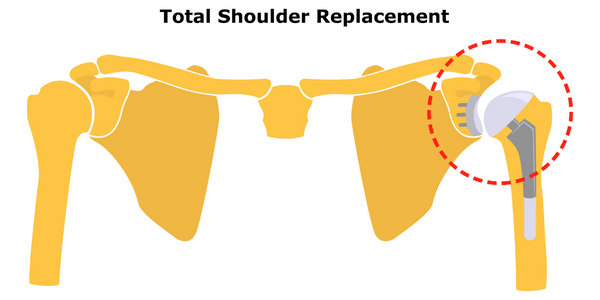Health Hub
Total shoulder replacement & reverse shoulder replacement: What’s the difference?

If you experience persistent pain in your shoulder that’s stopping you from living your life freely and you’ve tried non-surgical options such as steroid injections, exercise and physiotherapy, you may need a shoulder replacement.
We spoke to Consultant Orthopeadic Surgeon, Mr Addie Majed, who specialises in shoulder and elbow replacements about the differences between a reverse shoulder replacement and a total shoulder replacement, and how to know which surgery is right for you.
Should I get shoulder replacement surgery?
Over time the shoulder is a ball and socket joint and this can become painful and stiff, due to wear and tear, leading to arthritis. There are various options for managing arthritis, including non-surgical options, such as painkillers and injections, which will be discussed by your surgeon.
Many people who require a shoulder replacement will have found that their shoulder pain has not been relieved by painkillers, steroid injections or physiotherapy and are looking for the next step in treatment.
Shoulder replacements are also carried out if your shoulder has been damaged after injury or trauma, which is called post-traumatic arthritis. If you suffer from the autoimmune disease called Rheumatoid Arthritis, you may also benefit from a shoulder replacement.
What types of shoulder replacement are there?
What is a total shoulder replacement?
This open surgery is usually performed under general anaesthetic and may also be performed with a local anaesthetic injected into the nerves in your neck, called an interscalene nerve block.
An anatomic shoulder replacement mimics the normal human anatomy and is suitable for patients with intact shoulder tendons, called the rotator cuff. Here, the ball (humeral head) is replaced often with a metal ball and the socket (the glenoid) is replaced, often with a plastic cup.

What is a reverse shoulder replacement?
A reverse shoulder replacement is suitable for patients who do not have intact shoulder tendons, called the rotator cuff, hence they suffer from a condition called cuff arthropathy. Here, the ball is placed on the cup side of the shoulder (the glenoid) and the plastic cup is placed on a metal stem seated with the humerus.
As a result of the different biomechanics, reverse shoulder replacements tend to have a slightly lower range of above shoulder movement compared with anatomic shoulder replacements due to the lack of rotator cuff muscles. Additionally, they also are not designed to provide rotation in the shoulder (rotating outwards or arm behind back) but some patients can achieve this.
Otherwise the surgery is very similar to an anatomic shoulder replacement, including the benefits, risks, and recovery. Your rehabilitation will be slightly different as there will be focus on strengthening the outer muscle, the deltoid.

Recovery from shoulder replacement surgery
These surgeries aim to relieve your pain, improve the function and range of motion in your shoulder and significantly improve your quality of life, to get you back to doing the activities you love.
Immediately post surgery, and depending on your surgeon, you may awake with a drain (a plastic tube) from the shoulder joint to remove any excess blood so as to prevent a blood clot (haematoma), and this is usually removed one day after surgery.
Most patients remain in the hospital for 1-3 days but your recovery speed will depend on multiple factors, including your age, fitness level and the nature of your procedure. Throughout your stay you will have routine blood tests and an X-ray before you are discharged.
You will need to take a few weeks off work, approximately 4-6 weeks from a desk based job. If you have a manual job, your surgeon will discuss this with you in the clinic. You will be wearing a sling for 6-8 weeks.
The therapy team will review and advise you on an exact rehabilitation programme and a follow up will be arranged for you.
Possible risks and complications from shoulder replacement surgery
As with any medical procedure, it is possible for risks or complications to arise. Shoulder replacement surgery has a relatively low risk of serious complications, but the following risks and complications can occur in a small number of cases:
- General Anaesthetic and interscalene block (which will be discussed with you by your anaesthetist)
- Infection
- Bruising
- Bleeding within the shoulder
- Difficulty moving the shoulder and arm
- Pain and stiffness in the arm and hand
- Severe pain in the shoulder
- Blood clots
- Injury to the nerves
- Fracture
- Implant loosening
- Shoulder dislocation
The lifespan of a shoulder replacement is approximately 10-15 years in 90% of cases before it begins to wear out.
Booking your appointment
Once you’ve weighed up your options and decided this could be the right treatment for you, you’ll be ready to make an appointment with your consultant. At your appointment, your surgeon will take a detailed history, examine you and you may be sent for x-rays.
After which you and your consultant will discuss all the treatment options and you will be given plenty of time to decide which course of action suits your circumstances.
More information
- If you’re suffering with shoulder pain, speak to your GP about a possible referral to a specialist.
- If you don’t have a GP, you can make an appointment with one of our same day private GPs.
- Our Physiotherapy Department is fully equipped and staffed by experts on hand to help you back to full shoulder mobility and function.
Our Orthopaedic Surgery Department is a world famous centre of excellence for all orthopaedic surgeries including shoulder surgery. To enquire about shoulder surgery, call 020 3504 1558 or make an appointment to see one of our experts.
Article Sections
Latest Hospital News
Should you wish to speak to our press team, please visit Press Enquiries




